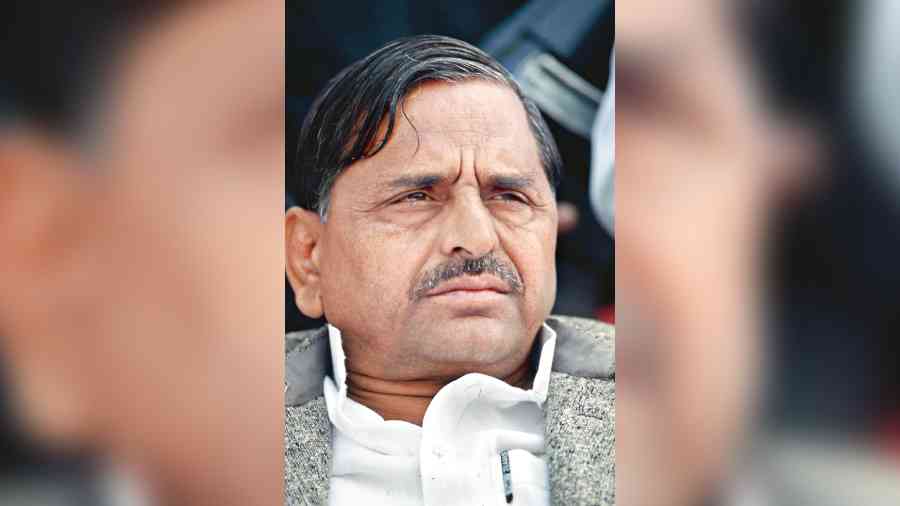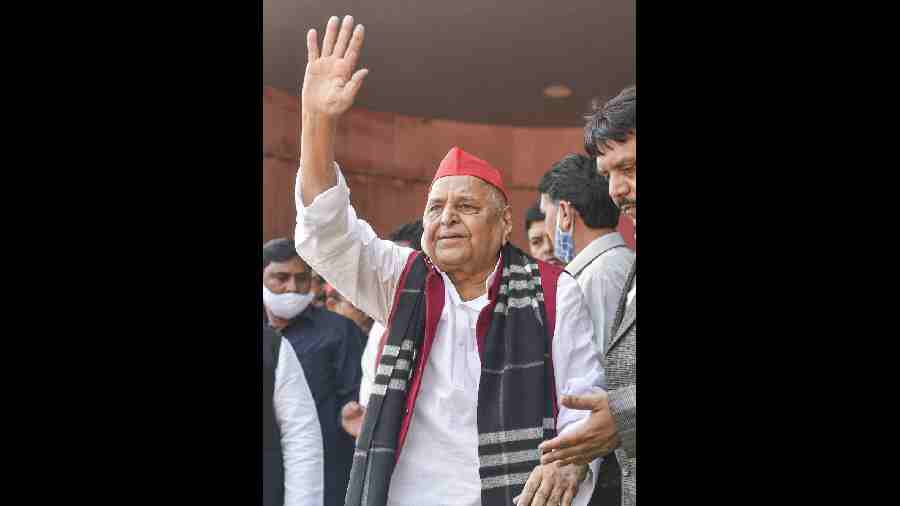Mulayam Singh Yadav, who shed — or embraced — so many shades in his roller-coaster public life that in the end he may have escaped definition, died in a Gurgaon hospital on Monday. He was 82.
Mulayam began as a stitched-to-the-earth socialist of the Lohia school, who went out crying change on a bicycle which would one day become the symbol of his Samajwadi Party (SP). He ended up, courtesy the swashbuckling brokerage of Amar Singh, as a high roller who would routinely tryst with celebrity from Bollywood to big business.
He’d have Amitabh Bachchan on one side, Anil Ambani and Subrata “Sahara” Roy on the other. His association with Amar and Amitabh prompted some to wisecrack that they were the latter-day “Amar Akbar Anthony”, drawing from the superstar’s movie title and Mulayam’s reputation as a protector of Muslims.
Perhaps the last of the dhoti-wearing generation of politicians, Netaji, as he was known, fit the unlikely description of socialite socialist.
As chief minister of Uttar Pradesh, he declared that “no bird would be able to fly into Ayodhya” and directed police to open fire on the hordes determined to violently raid the Babri Masjid in 1990. Years later, desperate to make a bid for prime ministership, he sought pardon from the voters of west-central UP, though not to much avail.
The “Mulla Mulayam” label, flung at him by the Hindutva apparatchik following the 1990 police order, had come to stick. He wouldn’t ever abandon the secular moorings of his politics, but couldn’t always be relied upon to stick to his word.
Mulayam famously gave the Congress a last-minute slip in 1999, making Sonia Gandhi’s “we have 272” proverbial for political embarrassment. In 2012, he assured Mamata Banerjee he would not support Pranab Mukherjee for President, but turned on the promise no sooner than he had made it.
Relying on skills he had picked up as a young wrestler, Netaji dodged and juggled unabashedly along the way --- doing what suited his ends, even if it had to be a treacherous turn --- with the gumption to not only survive but also prosper.
Not everything about his politics was savoury. The SP was notorious for harbouring criminal elements among its ranks, and among supporter-sympathisers. But he himself said once that he needed to survive in a jungle, and acquired what he needed.
On the mat, Mulayam was known as a “charkha trick” expert, picking up and placing the opponent on his shoulders and spinning him before throwing him to the ground. A postgraduate in political science and holder of a BEd degree, he was a village schoolmaster in Mainpuri.
He was elected as an MLA for the first time in 1967, from Jaswantnagar in Etawah, his hometown, as a Sanyukt Socialist Party candidate.
Mulayam had no permanent friends -– or foes. He took out a Kranti Yatra in 1989 as a Janata Dal leader “to oust the Congress from UP” and eventually became chief minister in December 1989 with outside support from the BJP.
He dumped his socialist friend Chandra Shekhar and supported V.P. Singh for Prime Minister in 1989. In 1990, Mulayam left his friend V.P. Singh and pulled down his government to support Chandra Shekhar in the name of “political experimenting”. In return, he got the support of the Congress to continue as chief minister till June 1991.
Mulayam became chief minister again in December 1993 with the backing of the Bahujan Samaj Party and remained there till June 1995, when the BSP withdrew support. He was defence minister in the Deve Gowda government.
Mulayam appeared closest to the CPM and the CPI but dumped them in 2008 to support the Congress-led UPA on the Indo-US nuclear deal.
He used to claim he was against the Hindutva forces but forged a friendship with Kalyan Singh, one of the champions of Hindutva, in the 2009 Lok Sabha elections. However, he issued a written apology to Muslims after his party won only 23 seats (he had expected to bag 50 of the state’s 80 seats) in the Lok Sabha.
But Mulayam was not immune to parental weaknesses. When his son Akhilesh planned to neutralise his aging father’s influence on the SP and marginalise his uncle Shivpal Yadav by taking over as party president on January 1, 2017, many believed that Mulayam was going to take a major decision against his son. But the SP founder was actually frantically calling his confidants to ensure a smooth transition.
Mulayam’s second wife, Sadhana Gupta, died in the same hospital in Gurgaon in July this year. Malti Devi, his first wife and mother of Akhilesh, had passed away in 2005.
Mulayam’s wish to become Prime Minister was never fulfilled. Addressing party workers after the 2013 Muzaffarnagar riots, which claimed about 60 lives, Mulayam was quoted as saying in at least three meetings: “I am asking you for the last time to forgive my mistakes and make me PM. I will not ask you again.”
An unspecified mistake apparently was the order to open fire in Ayodhya in 1990.












